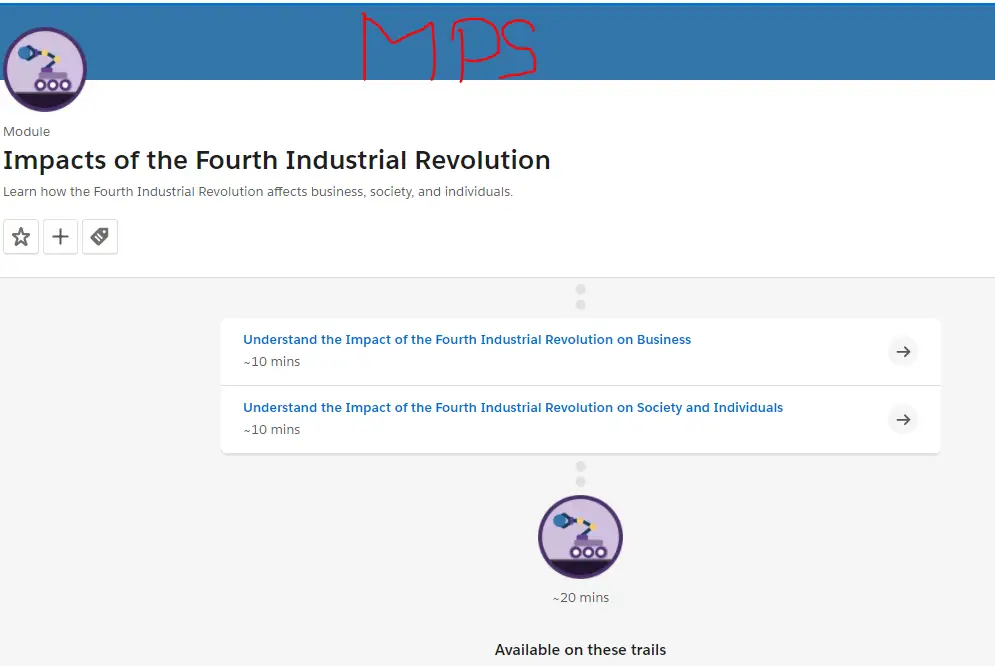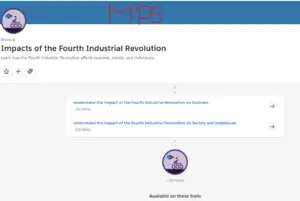The fourth industrial revolution is one of the most disruptive events that will affect most sectors of the economy in the next 10 years.
A lot of companies, big and small are already taking part in it. The main drivers behind it are 3D printing, Artificial Intelligence, Robotics, Augmented Reality, and Virtual Reality.

#1.Understand the Impact of the Fourth Industrial Revolution on Business
Q1)How are customer expectations shifting in response to the Fourth Industrial Revolution?
I)Customers now expect to engage with bots, not real people.
II)Customers expect businesses to anticipate their needs.
III)Customers expect businesses to provide personalized service.
IV)Customer expectations are not shifting.
V)B and C
[bg_collapse view=”button-green” color=”#4a4949″ expand_text=”Show Answers” collapse_text=”Hide Answers” ]
V)B and C
[/bg_collapse]
Q2)Which of the following best characterizes the effect of the Fourth Industrial Revolution on business?
I)B2C industries like retail are changing, while B2B industries are not.
II)The technology industry is the only industry undergoing transformation due to the 4th Industrial Revolution innovations.
III)The Fourth Industrial Revolution is reshaping every industry.
IV)Business is becoming less complex thanks to new technology.
[bg_collapse view=”button-green” color=”#4a4949″ expand_text=”Show Answers” collapse_text=”Hide Answers” ]
III)The Fourth Industrial Revolution is reshaping every industry.
[/bg_collapse]
#2.Understand the Impact of the Fourth Industrial Revolution on Society and Individuals
Q1)What are some of the key societal areas affected by the Fourth Industrial Revolution?
I)Trust
II)Employment
III)Privacy
IV)Equality
V)All of the above
[bg_collapse view=”button-green” color=”#4a4949″ expand_text=”Show Answers” collapse_text=”Hide Answers” ]
V)All of the above
[/bg_collapse]
Q2)How can we best ensure the Fourth Industrial Revolution is a force for good?
I)Businesses should innovate as quickly as possible.
II)Policymakers should not impose new regulations on technology.
III)In order to remain neutral, governments should not adopt any new technologies.
IV)Businesses, governments, and other stakeholders must work together to maximize the benefits and minimize the challenges.
[bg_collapse view=”button-green” color=”#4a4949″ expand_text=”Show Answers” collapse_text=”Hide Answers” ]
IV)Businesses, governments, and other stakeholders must work together to maximize the benefits and minimize the challenges.
[/bg_collapse]
People also Ask:
What is meant by the fourth industrial revolution?
The fourth industrial revolution is a term that was coined by Klaus Schwab, the founder of the World Economic Forum. According to Schwab, we are currently in the midst of a major shift in how business and economic functions are conducted across the globe.
Schwab describes this fourth industrial revolution as being driven by technologies such as robotics automation, artificial intelligence, and 3D printing. These technologies are beginning to have a significant impact on how businesses operate, from manufacturing to distribution and supply chains.
What is the importance effect and impact of 4th industrial revolution?
The fourth industrial revolution is here. This revolution will completely change the way we work and live, and it could be the biggest change in human history. New technologies are being developed at a rapid pace, everything from artificial intelligence to cyber-physical systems.
The 4th industrial revolution has already begun, but the real changes will start about five years from now when most of us will see how our lives are changing because of these new technologies. The workplace will be overhauled, and people who adapt quickly to these changes will have an advantage over others.
What are the negative impacts of the fourth industrial revolution?
With the advent of big data, machine learning, and artificial intelligence in our lives, the fourth industrial revolution is on its way. According to Klaus Schwab, founder and executive chairman of the World Economic Forum (WEF), the 4th industrial revolution is a series of disruptive technologies that are bringing about changes in all aspects of life at a faster pace than ever before.
The 4th industrial revolution will change everything from how we learn, what we do for work, how we spend our free time, etc. For instance, think about how your job will change when machines start doing it better and cheaper than you.
What are the benefits of the 4th industrial revolution?
The 4th industrial revolution is all about innovation, technology, and progress. It’s mainly a collection of technologies that make our lives easier, faster, and more efficient, from self-driving cars to AI-driven bots and robots.
The 4th industrial revolution can help businesses all over the globe by improving:
- Production processes from logistics and supply chains to worker safety.
- Manufacturing quality and efficiency.
- Product development cycles.
How does the fourth industrial revolution impact government?
The fourth industrial revolution is here to stay and its impact will be felt all over the world, even in government. The fourth industrial revolution is an intensification of technology-driven economic change that is blurring the lines between the physical, digital, and biological spheres.
We are about to see a fundamental shift in how we conduct business and politics globally. Governments will have to adapt to this new environment or fall by the wayside. This new era will require governments to focus on five key areas:
- 1) responding to disruptive technologies that will disrupt the way we live
- 2) ensuring data privacy
- 3) adapting to the changing needs of citizens
- 4) managing our global environment
- 5) embracing a culture of innovation.
